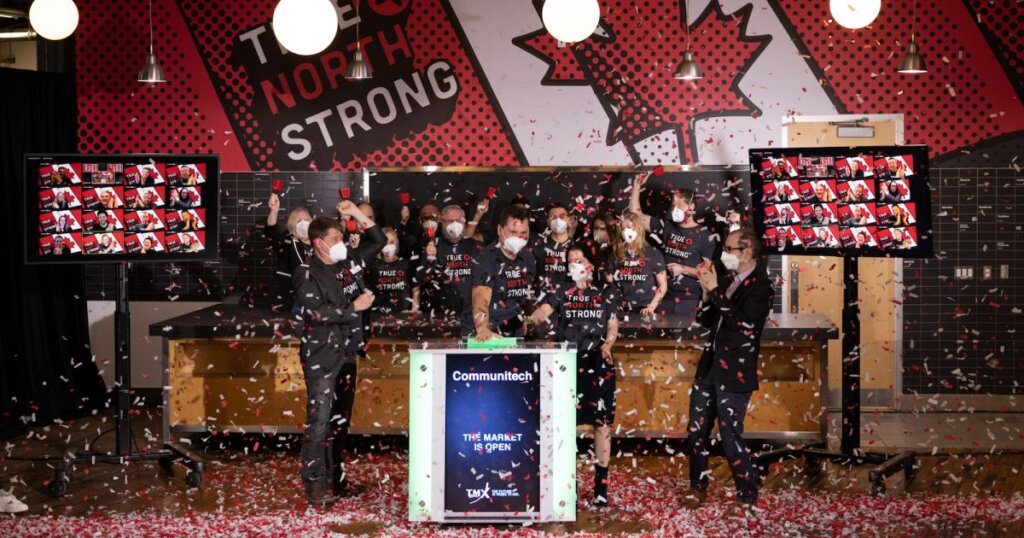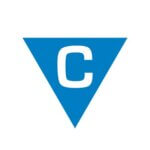Home » Tech Roundup for February 2022
Tech Roundup for February 2022

Make some noise!
Bells rang and confetti flew as tech founders gathered at Communitech on Feb. 22 for a special remote opening of the Toronto Stock Exchange.
It was a celebratory and historic event, marking the first time the TSX has opened the day’s trading from Waterloo Region.
The occasion? Celebrating the spectacular success of Canadian tech companies over the past year, with an emphasis on Waterloo Region. Two local companies – cybersecurity dynamo Magnet Forensics and edtech phenom D2L – began trading on the TSX in 2021, while more than a dozen others raised significant amounts of investment over the past 12 months.
“This is Canada’s moment,” Communitech CEO Chris Albinson told founders and supporters, some of whom tuned in virtually from across the country. “The momentum we’ve seen over the past year has been a nod to the incredible accomplishments within our national tech community. And we’re just getting started. Thank you for helping to build Canada’s tech community.”
ApplyBoard CEO and co-founder Martin Basiri added to the buzz. In a Q&A session, he told BetaKit Associate Editor Meagan Simpson that his edtech unicorn – valued at $4 billion – is considering a possible IPO down the road.
Rolling thunder
And things keep rolling. Just hours before the TSX event got under way, two Waterloo Region companies provided even more reason to celebrate.
Waterloo-based cybersecurity powerhouse eSentire Inc. announced a massive US$325 million raise that propelled it to unicorn status with a valuation north of US$1 billion. At the same time, ISP and connectivity solution provider RouteThis announced a CDN$25-million Series A raise.
Earlier in the month, Kitchener-based DOZR continued to blaze a trail with its online heavy-equipment rental platform. The company announced a Series B raise of CDN$27.5 million. CEO and co-founder Kevin Forestell said the company plans to double its current staff count to 130 by the end of 2022 to help expand the DOZR platform to U.S. markets in Arizona, Washington, Nevada, Colorado and Tennessee.
Meanwhile, Waterloo-based RideCo Inc. announced a Series A raise of CDN$20 million that will help the company further develop its rideshare transit software, enhance customer support and enter new markets.
Market access
Chalk up a big win for cybersecurity startup Agilicus. The Kitchener-based company, led by Sandvine co-founder Don Bowman, landed a contract with the federal government that gives it a chance to demonstrate the value of its secure network-access technology.
Getting a toehold in government procurement is a struggle for many Canadian companies. Ottawa is trying to help. The Agilicus contract was facilitated through Innovative Solutions Canada (ISC), an initiative that streamlines the government procurement process to stimulate research and the commercialization of innovative technology.
“You get validation of your approach, you get feedback on your implementation and you get to announce the Government of Canada as a reference customer, all of which has great value,” Bowman told Tech News.
Founder recognition
Founders with ties to Waterloo Region were among the 50 “Changemakers” honoured in a special report in the Globe and Mail’s Report on Business magazine. They included Donna Litt, co-founder and COO of sales academy Uvaro; Sarah Landstreet, CEO and founder of sustainable packaging manufacturer Georgette Packaging; Martin Basiri, co-founder and CEO of edtech unicorn ApplyBoard; and Hannah Sennik, co-founder and CEO of Rekammend, whose app helps people with neurological impairments to communicate more effectively.
Socially just tech
If technological progress is to be socially just and democratic, tech workers should reach into the social sciences and humanities to help interpret and understand the data.
That was one of the provocative themes explored by Simon Fraser University prof Wendy Chun as the keynote speaker at the second Critical Tech Talk event.
Produced by the Critical Media Lab at the University of Waterloo and supported by Communitech, Critical Tech Talks are candid conversations about how innovators can strive for positive change with a “tech for good” ethos.
Talent tactics
Offering flexible work hours is emerging as one of the most important ways for tech companies to attract and retain talented employees.
An article in the Toronto Star quotes Communitech’s own Head of Talent and Academy, Kyra Jones, on the topic. It also highlights the flexibility options offered by Ada, a Toronto-based chatbot unicorn that participated in Communitech’s former Rev accelerator program. Ada has introduced a Digital Bill of Rights for employees, which allows them to work remotely full time, and work from another country for up to 80 days a year.
Such perks dovetail with Melanie Baker’s line of thinking. In an M-Theory column, she urged employers not to neglect the needs of existing employees as they scramble to attract new talent.
In another column, Baker plays with the Millennial jest around “adulting” – the idea that you look for someone else to handle “grownup” responsibilities when the task at hand requires some heavy-duty decision making. Baker’s advice for those who feel unqualified to make a call: “Sit with it and really think about why you don’t think you’re the adult for the job.”
Alex Kinsella also addressed talent in his Tech About Town column. He revisited the work of TalentLift, a non-profit that helps Canadian companies recruit skilled refugees from around the world.
In another column, Kinsella highlighted PEER Group’s 30th anniversary and the Kitchener-based tech company’s long track record of supporting community organizations, such as KidsAbility.
In other news
- Software integration company InFlight Corp., which has a development office in Kitchener, was acquired by Skuid of Chattanooga, Tenn. for undisclosed terms. Skuid said it plans to keep InFlight’s Kitchener operation and 22-person team.
- Kitchener-based Vidyard celebrated a heady milestone with the announcement that 250,000 companies around the world now use its video messaging and hosting tools.
- RainStick picked up two awards at the recent Kitchen and Bath Industry Show in Florida. The clean technology company earned the Best of KBIS 2022 Impact Award and snagged first place in the KBIS Kickstarter Awards.
- Google Canada committed $1.5 million to the Canadian Council for Aboriginal Business (CCAB) to support Indigenous businesses and entrepreneurs across the country.
- Waterloo-based MapleSoft is establishing direct operations in China with the opening of a wholly owned subsidiary in Shanghai.
- Axonify has added new clients such as AT&T, Kroger, and Dollar General to the list of customers using its frontline training platform, boosting its growth rate to 35 per cent in 2021. The Waterloo-based company said it plans to grow by another 20 per cent in 2022 across all areas of the business in both North America and Europe, with an emphasis in eastern Canada as well as the U.S. and U.K.
Sign up to receive the Roundup each month by visiting communitech.ca/technews and scrolling to the bottom of the page.
Communitech
https://communitech.ca
"Communitech helps tech-driven companies start, grow and succeed. Communitech was founded in 1997 by a group of entrepreneurs committed to making Waterloo Region a global innovation leader. At the time it was crazy talk, but somehow this community managed to pull it off. Today, Communitech is a public-private innovation hub that supports a community of more than 1400 companies — from startups to scale-ups to large global players. Communitech helps tech companies start, grow and succeed in three distinct ways: - Communitech is a place – the center of gravity for entrepreneurs and innovators. A clubhouse for building cool shit and great companies. - Communitech delivers programs – helping companies at all stages with access to capital, customers and talent. We are here to help them grow and innovate. - Communitech partners in building a world-leading ecosystem – making sure we have all the ingredients (and the brand) to go from a small startup to a global giant."


